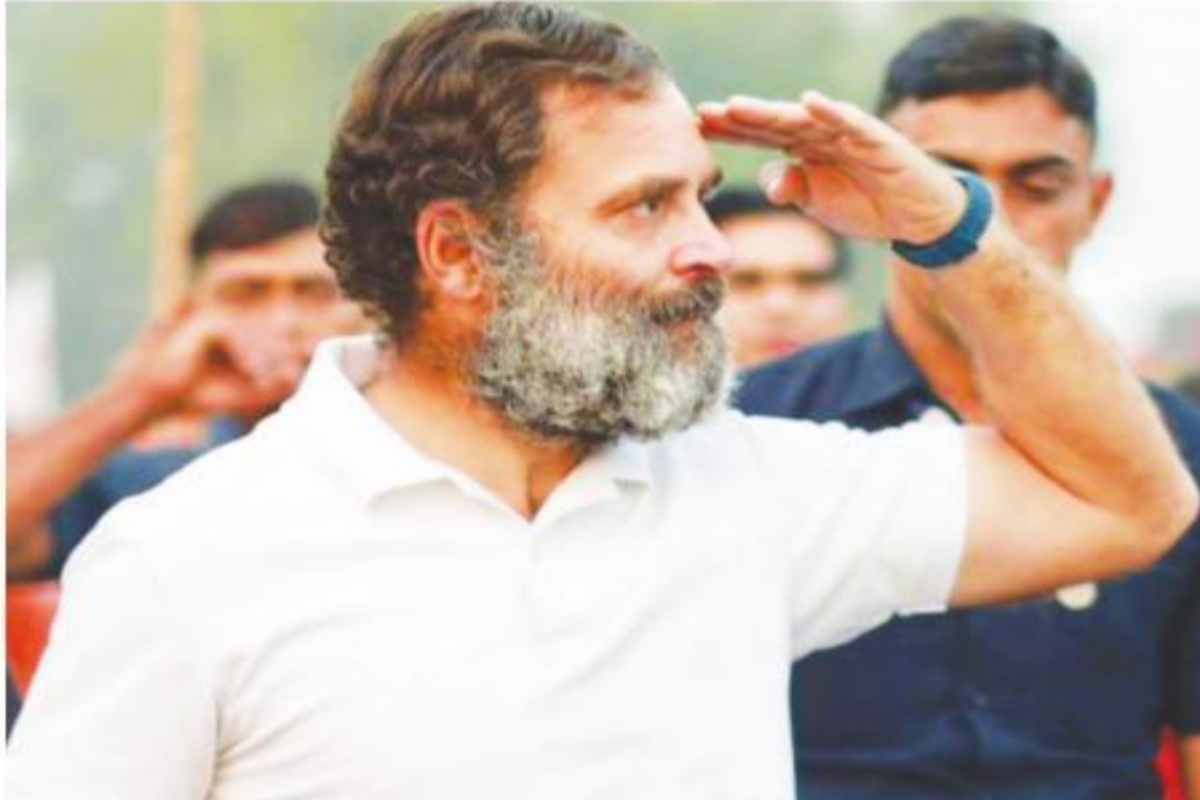BJP fields 2 dummy candidates
Another Sharmila Sarkar has joined the fray against Dr Sharmila Sarkar, the Trinamul Congress candidate from Bardhaman Purba seat.
As the Yatra marches on, Rahul sticks to his narrative: “We are here to open the shop of love in your bazaar of hatred.”

(Photo: SNS)
(Has the ‘Bharat Jodo’ Yatra, completing over 100 days, thrown up a a re-invented Congress leader Rahul Gandhi as was intended?
Congress would like to rebrand Rahul as a young, caring, and ideologically sound leader. True to script, he has shown a different persona – a son tying his mother’s shoelaces, hugging older women, and playing with children – as a kind, warm hearted person.
For the first time after many years, the grand old party is trying to reach out to people in remote areas and villages. Rahul began his 3,500 km journey from Kanyakumari, flagged off by Tamil Nadu chief minister M.K.Stalin on September 7. The Yatra has taken a recess for a week to resume from January 3. It will end in Jammu and Kashmir at the end of January.
Advertisement
It is time to assess the impact so far of the Yatra on the party, the opposition, the ruling BJP, and the public. Rahul maintains that the Yatra is not for political or personal interests but against the politics of hate, fear and violence. He has impressed the public with his tireless walking, sweating in the heat and dust, and soaking in the rain – all with one aim – to fight the RSS. One cannot find fault with Rahul’s efforts. Plus, he is physically quite fit.
As the Yatra marches on, Rahul sticks to his narrative: “We are here to open the shop of love in your bazaar of hatred.” He has changed his campaign style to a nuanced one.
Rahul has covered parts of Tamil Nadu, Kerala, Karnataka, Andhra Pradesh, Telengana, Madhya Pradesh, Rajasthan, Maharashtra, Haryana, and Delhi.
During the Yatra, Rahul gets first-hand information from the cadre. Congress workers who had come out of their homes these past few months have accompanied him. The response in the south has cheered the Congress and alerted the BJP.
Will the Yatra help Congress to get better electoral gains? And will it change perceptions about Rahul? Listening to senior leaders in his party, Rahul has demonstrated restraint in personally attacking Prime Minister Narendra Modi. His aggressive attack on Modi in 2019 had not clicked.
Secondly, his criticism of the business houses of Adani and Ambani, whom he alleged Modi had favoured, has become subtle and nuanced. Rahul questions India’s wealth concentrated in the hands of a few individuals without taking their names.
Thirdly, Rahul talks of love and hatred and how the RSS brand of politics has torn up society with hate.
As for the impact on Congress, the Yatra’s response has cheered the cadres and boosted their morale. There are plans to ask state leaders to cover their respective states on foot following this Yatra in the months ahead.
Rahul’s efforts have temporarily united the factional Congress leaders in different states, including Karnataka, Rajasthan and Madhya Pradesh, where Congress has a direct fight with BJP. As for the ruling BJP, it is clear that the Modi government is disturbed about the Yatra. The government has cautioned Rahul and his party about the increasing Covid cases to destabilise the Yatra. While the Yatra’s success in the south has been good, it is still being determined whether the other regional satraps would join it. Some prominent opposition leaders, particularly in UP, have given a luke-warm response to Rahul’s invitation to join the Yatra. Keeping the 2024 elections and nine Assembly polls this year in mind, Rahul has signaled to the opposition leaders to unite if they want to halt the BJP juggernaut.
Over the past 100-odd days, Congress chief ministers, some Bollywood actors, academics, activists, and even some leaders from other parties have joined the march in a show of support. Former Reserve Bank Governor Raghuram Rajan’s presence added to the prestige of the march.
Initially, the BJP and most media wrote off the Yatra, claiming it would only click in the south, where the BJP is weak. Crowds in Tamil Nadu we’re credited to the ruling DMK, a Congress ally.
Congress hopes that its three-pronged criticism of the Modi government, the issues of social polarisation, inflation, and unemployment, would capture popular support. While it may not alter the political landscape but it may strengthen the democratic process.
Though Congress has begun well, it still needs a popular political narrative to lure swing voters, especially the middle classes. Can the Congress rise to the challenge of keeping the momentum up until the 2024 Lok Sabha polls? Will Congress work hard to improve its electoral prospects, harvesting the goodwill from the Yatra? However, Congress’s new-found agility is yet to translate into electoral success. The results of the nine Assembly elections this year will give us some clues.
Advertisement